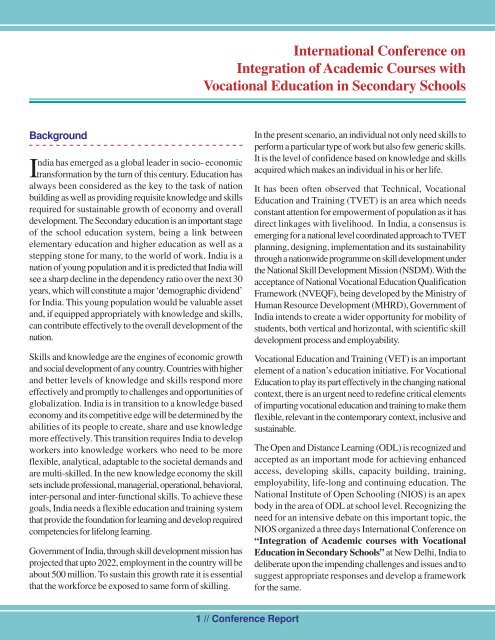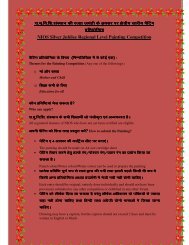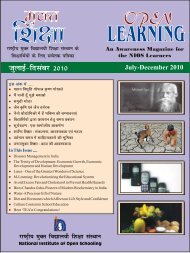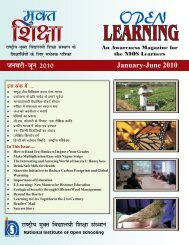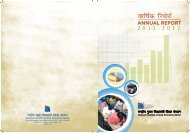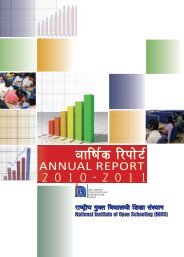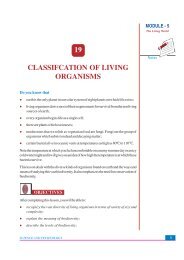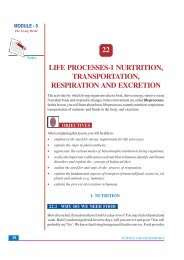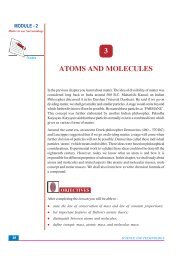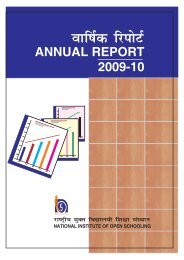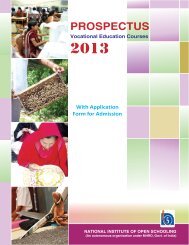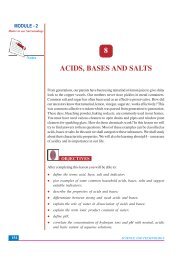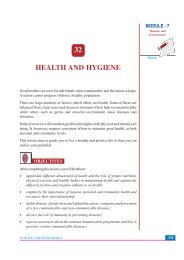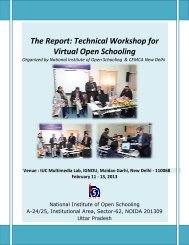Conference Report - The National Institute of Open Schooling
Conference Report - The National Institute of Open Schooling
Conference Report - The National Institute of Open Schooling
Create successful ePaper yourself
Turn your PDF publications into a flip-book with our unique Google optimized e-Paper software.
International <strong>Conference</strong> on<br />
Integration <strong>of</strong> Academic Courses with<br />
Vocational Education in Secondary Schools<br />
Background<br />
India has emerged as a global leader in socio- economic<br />
transformation by the turn <strong>of</strong> this century. Education has<br />
always been considered as the key to the task <strong>of</strong> nation<br />
building as well as providing requisite knowledge and skills<br />
required for sustainable growth <strong>of</strong> economy and overall<br />
development. <strong>The</strong> Secondary education is an important stage<br />
<strong>of</strong> the school education system, being a link between<br />
elementary education and higher education as well as a<br />
stepping stone for many, to the world <strong>of</strong> work. India is a<br />
nation <strong>of</strong> young population and it is predicted that India will<br />
see a sharp decline in the dependency ratio over the next 30<br />
years, which will constitute a major ‘demographic dividend’<br />
for India. This young population would be valuable asset<br />
and, if equipped appropriately with knowledge and skills,<br />
can contribute effectively to the overall development <strong>of</strong> the<br />
nation.<br />
Skills and knowledge are the engines <strong>of</strong> economic growth<br />
and social development <strong>of</strong> any country. Countries with higher<br />
and better levels <strong>of</strong> knowledge and skills respond more<br />
effectively and promptly to challenges and opportunities <strong>of</strong><br />
globalization. India is in transition to a knowledge based<br />
economy and its competitive edge will be determined by the<br />
abilities <strong>of</strong> its people to create, share and use knowledge<br />
more effectively. This transition requires India to develop<br />
workers into knowledge workers who need to be more<br />
flexible, analytical, adaptable to the societal demands and<br />
are multi-skilled. In the new knowledge economy the skill<br />
sets include pr<strong>of</strong>essional, managerial, operational, behavioral,<br />
inter-personal and inter-functional skills. To achieve these<br />
goals, India needs a flexible education and training system<br />
that provide the foundation for learning and develop required<br />
competencies for lifelong learning.<br />
Government <strong>of</strong> India, through skill development mission has<br />
projected that upto 2022, employment in the country will be<br />
about 500 million. To sustain this growth rate it is essential<br />
that the workforce be exposed to same form <strong>of</strong> skilling.<br />
In the present scenario, an individual not only need skills to<br />
perform a particular type <strong>of</strong> work but also few generic skills.<br />
It is the level <strong>of</strong> confidence based on knowledge and skills<br />
acquired which makes an individual in his or her life.<br />
It has been <strong>of</strong>ten observed that Technical, Vocational<br />
Education and Training (TVET) is an area which needs<br />
constant attention for empowerment <strong>of</strong> population as it has<br />
direct linkages with livelihood. In India, a consensus is<br />
emerging for a national level coordinated approach to TVET<br />
planning, designing, implementation and its sustainability<br />
through a nationwide programme on skill development under<br />
the <strong>National</strong> Skill Development Mission (NSDM). With the<br />
acceptance <strong>of</strong> <strong>National</strong> Vocational Education Qualification<br />
Framework (NVEQF), being developed by the Ministry <strong>of</strong><br />
Human Resource Development (MHRD), Government <strong>of</strong><br />
India intends to create a wider opportunity for mobility <strong>of</strong><br />
students, both vertical and horizontal, with scientific skill<br />
development process and employability.<br />
Vocational Education and Training (VET) is an important<br />
element <strong>of</strong> a nation’s education initiative. For Vocational<br />
Education to play its part effectively in the changing national<br />
context, there is an urgent need to redefine critical elements<br />
<strong>of</strong> imparting vocational education and training to make them<br />
flexible, relevant in the contemporary context, inclusive and<br />
sustainable.<br />
<strong>The</strong> <strong>Open</strong> and Distance Learning (ODL) is recognized and<br />
accepted as an important mode for achieving enhanced<br />
access, developing skills, capacity building, training,<br />
employability, life-long and continuing education. <strong>The</strong><br />
<strong>National</strong> <strong>Institute</strong> <strong>of</strong> <strong>Open</strong> <strong>Schooling</strong> (NIOS) is an apex<br />
body in the area <strong>of</strong> ODL at school level. Recognizing the<br />
need for an intensive debate on this important topic, the<br />
NIOS organized a three days International <strong>Conference</strong> on<br />
“Integration <strong>of</strong> Academic courses with Vocational<br />
Education in Secondary Schools” at New Delhi, India to<br />
deliberate upon the impending challenges and issues and to<br />
suggest appropriate responses and develop a framework<br />
for the same.<br />
1 // <strong>Conference</strong> <strong>Report</strong>


